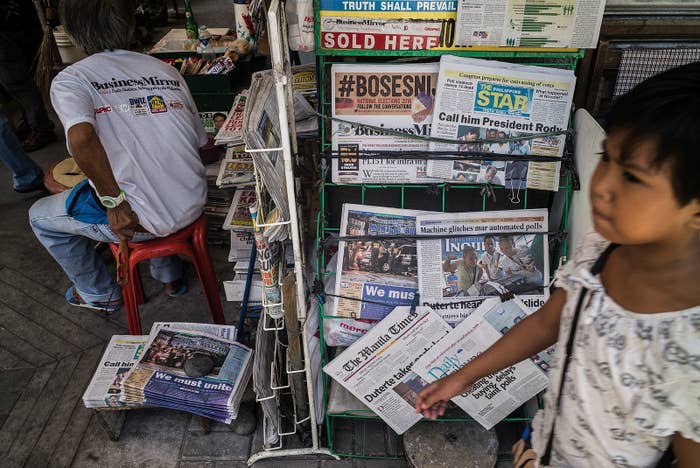
From Vietnam to Indonesia, press freedom in Southeast Asia is deteriorating, spurred by the rise of authoritarian governments and enabled by the Trump administration's relative indifference to human rights issues.
Even in the Philippines, home to some of the most outspoken news outlets in the region, the pressure is rising against the media. This week, the government withdrew the operating license for Rappler, an online news outlet that had published many critical stories about President Rodrigo Duterte.
It was the latest blow to the country's independent media by the increasingly authoritarian Duterte, and another signal of a future for press freedom in the region that rights groups say appears increasingly dark.
"The situation for journalists in Southeast Asia has arguably never been more dire," said Shawn Crispin, Southeast Asia representative for the Committee to Protect Journalists. "The online spaces that opened the way for new critical and probing voices is now aggressively being closed by regional governments through legislation, legal intimidation, and threats."
It's a stark contrast to the mid-2000s, a more optimistic era when the influx of social media and gutsy online news outlets suggested a rosier outlook for free information. A decade later, governments in the region are responding to the gains made by independent media online with greater censorship and repression.
In Cambodia, the government forced the closure of the Cambodia Daily newspaper with a massive tax bill and shut down two major radio stations. In Thailand, the military is putting greater pressure on news outlets that publish critical stories.
In addition, reporters across the region are facing years in prison over their work. In Vietnam, citizen journalist Nguyen Van Hoa was sentenced to seven years in prison for using a camera mounted on a drone to film protesters demonstrating against a toxic steel plant spill. In Myanmar, two Reuters reporters, Wa Lone and Kyaw Soe Oo, face up to 14 years in prison under a colonial-era law called the Official Secrets Act.
"Laws and legislation is abused, often by governments and fundamentalist groups, to prosecute the media and restrict freedom of expression," said Marte Hellema of the Asian Forum for Human Rights and Development. "Combined with the culture of impunity across the region, it results in the repression of the freedom of press on a daily basis."
Rappler has faced pressure from the government for months over its critical coverage of Duterte, including his violent, police-led campaign against drug users. Things got worse for the site after it released a leaked transcript of a call between Duterte and President Donald Trump, which included a discussion about North Korea. Duterte himself singled out the publication in his State of the Nation address last July, claiming it is fully American owned. (It's not.)
Rappler plans to appeal the decision by the Philippines' Securities and Exchange Commission, calling the ruling "pure and simple harassment."
NUJP STATEMENT: We Stand with @rapplerdotcom
Rising authoritarianism in the region, including from governments like Duterte's, is likely one reason for the crackdown on the press. But rights groups say there is another problem — the US decision to put human rights on the back burner. The Trump administration's "America First" philosophy has often meant that the government focuses more on transactional diplomacy in service of US interests rather than promoting values like freedom of speech and rule of law.
Trump's apparent indifference to Duterte's attacks on the press were thrown into relief during a trip to the Philippines in November, when he laughed after Duterte joked that journalists were spies. “We’ve had a great relationship,” Trump said of Duterte at the time.
Public pressure from US officials as well as private diplomatic pressure used to be a strong incentive for Southeast Asian governments, many of whose economies are closely linked with the US. But that's largely ended since Trump took office, rights groups say.
"Local organizations working on human rights issues are home alone, and their governments know it — dictators are taking opportunities to achieve gains because the biggest voice in the human rights community isn't there," said Phil Robertson, deputy director of the Asia division of Human Rights Watch.
"When we talk about human rights issues in southeast Asia, much of the pressure and leverage comes from governments and UN agencies. During the Obama administration, the US was in the middle of those fights," Robertson said. "All of these countries were feeling an active, engaged policy by the US on human rights issues and now that has all evaporated."
